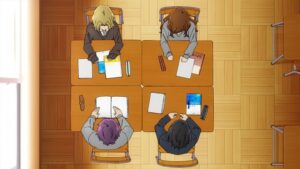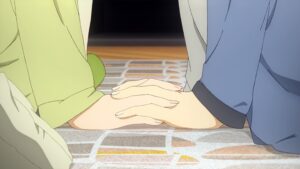Any time a romcom dips into one of its characters’ sad pasts, a tightrope materializes beneath its metaphorical feet. Throw them a pity party and fall to the left; trivialize their pain and topple to the right. Kaguya-sama’s indulgent depiction of Ishigami’s backstory is a good example of what can go wrong during this process – it’s been lodged uncomfortably in my brain since I first saw it eight months ago, so I was highly conscious of the similar issue that Horimiya might create for itself. Now that we’ve gotten a glimpse of Miyamura’s elementary and middle school woes, it’s clear that the show intends to treat his past experiences with a tad more nuance than that, but it’s not out of the woods yet. The true test of Horimiya’s capabilities will arrive when we learn what happened to Miyamura ten years ago – what caused him to wish he could reassure that version of himself that things would be okay.
That wish was born during a rooftop scene between Miyamura and Ishikawa, after the purple-haired boy told his awkward friend that a little weirdness was fine with him. This simple bit of encouragement was sufficient to bring Miyamura to tears, as it ran counter to the years of “weird” accusations he’d endured throughout his youth – he now has such a negative relationship with the word that he immediately apologized to Ishikawa upon hearing it. I’m not satisfied with the catharsis of a statement like “it’s okay to be weird,” though, and what makes me optimistic is that Miyamura isn’t, either. He’s always wondering whether he truly belongs in his friend group, or denying that Hori really likes him. Even though this episode gave him some peace of mind on those fronts, I expect that he’ll continue to doubt himself and struggle with his self-image until the defining event of his childhood is dragged into the light.
Social maladjustment was one of the episode’s big themes – another one was hands. The script actually linked the two, since Miyamura’s first flashback involved a group project where partners had to hold hands, and nobody wanted to pair up with him. In the present, though, he’s linking fingers with a beautiful girl, and returning her indirect confession of love to boot. It’s a stark contrast, but Horimiya eases us into it with a lot of hand talk throughout the episode: size, color, smoothness, and double-jointedness. I think there’s some extra significance to that last one, as Hori’s index finger is different from the rest, the same way that Miyamura was always the odd man out growing up. I’m not saying she had a similarly unpleasant school life (her treatment of a childhood friend in the previous episode tells us that she was a bully, if anything), but a “weird” finger does serve as a physical representation of her quirks, which we’ve seen at multiple points throughout the show thus far.
The Hori/Miyamura pairing is still driving the story at this point, but the show’s side characters have been gaining prominence with each week, especially Ishikawa. I already mentioned him above, but he did a lot more than provide encouragement this week – he was also a pseudo-antagonist, picking a fight with Miyamura over a girl they both like. This was probably my least favorite part of the episode, as it seemed unwilling to condemn its protagonist for his retaliation, instead foisting all the blame onto Ishikawa for initiating the argument. Not to be outdone, Remi made herself a target by expressing interest in Miyamura, though Hori handled this situation much better. “Hands off my man” isn’t exactly peak diplomacy, but at least it’s a clear position – something that neither of the boys were able to take before resorting to blows. Most romance anime fans are obsessed with “progress,” so in one sense her possessiveness bodes well for an imminent relationship. Horimiya has a lot more on its mind than hooking up, though, so I hope those elements are fleshed out both before and after this love triangle is put to rest.





I haven’t seen Kaguya-Sama– what would you say went wrong there?
It botched the backstory of one of its major characters (Ishigami) by pitting him against a shallowly-drawn bully, then smearing dramatic string music over their confrontation. Afterwards, the show absolved him of his part in the fight with a flattering speech from the protagonist.
Take all that with a grain of salt – most people consider Ishigami’s story to be highly sympathetic, so I’m in the minority.